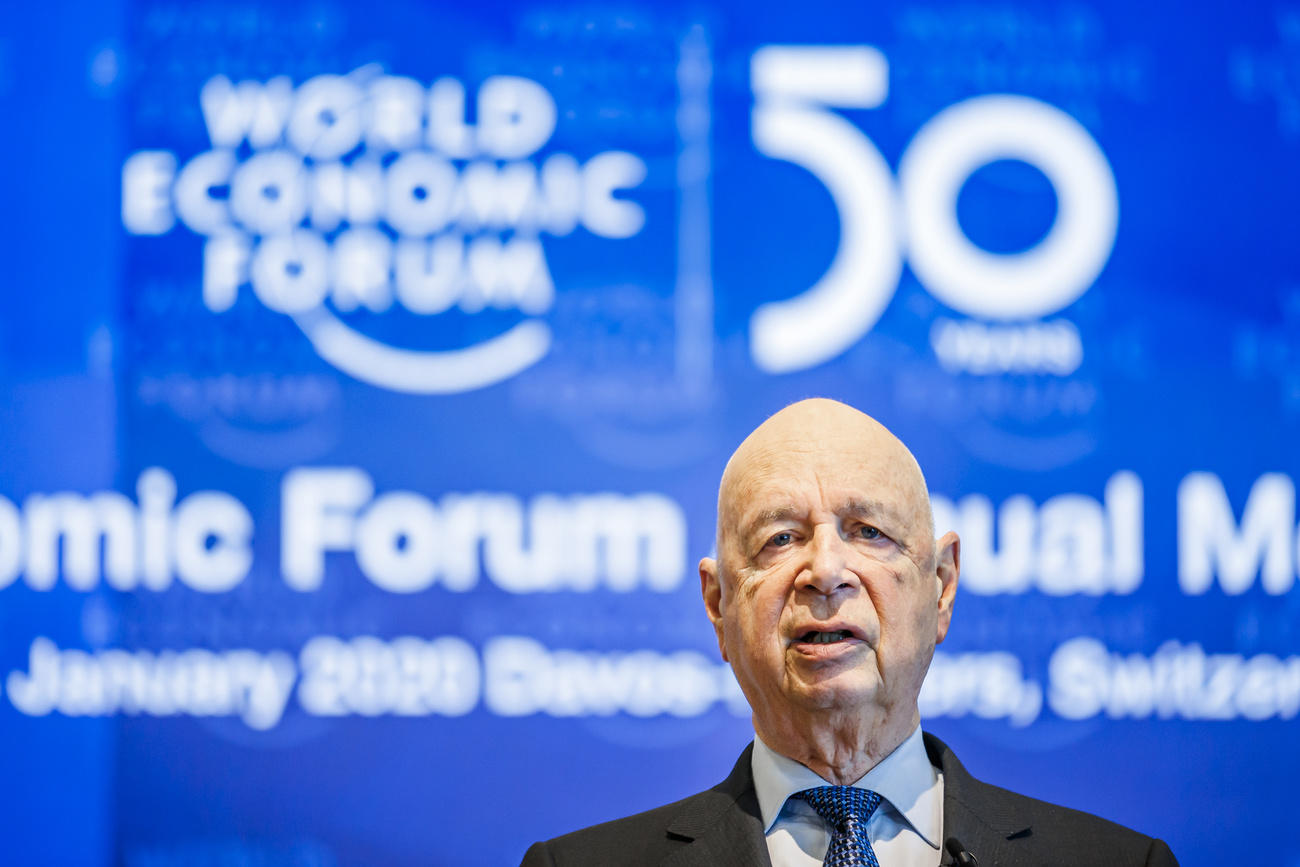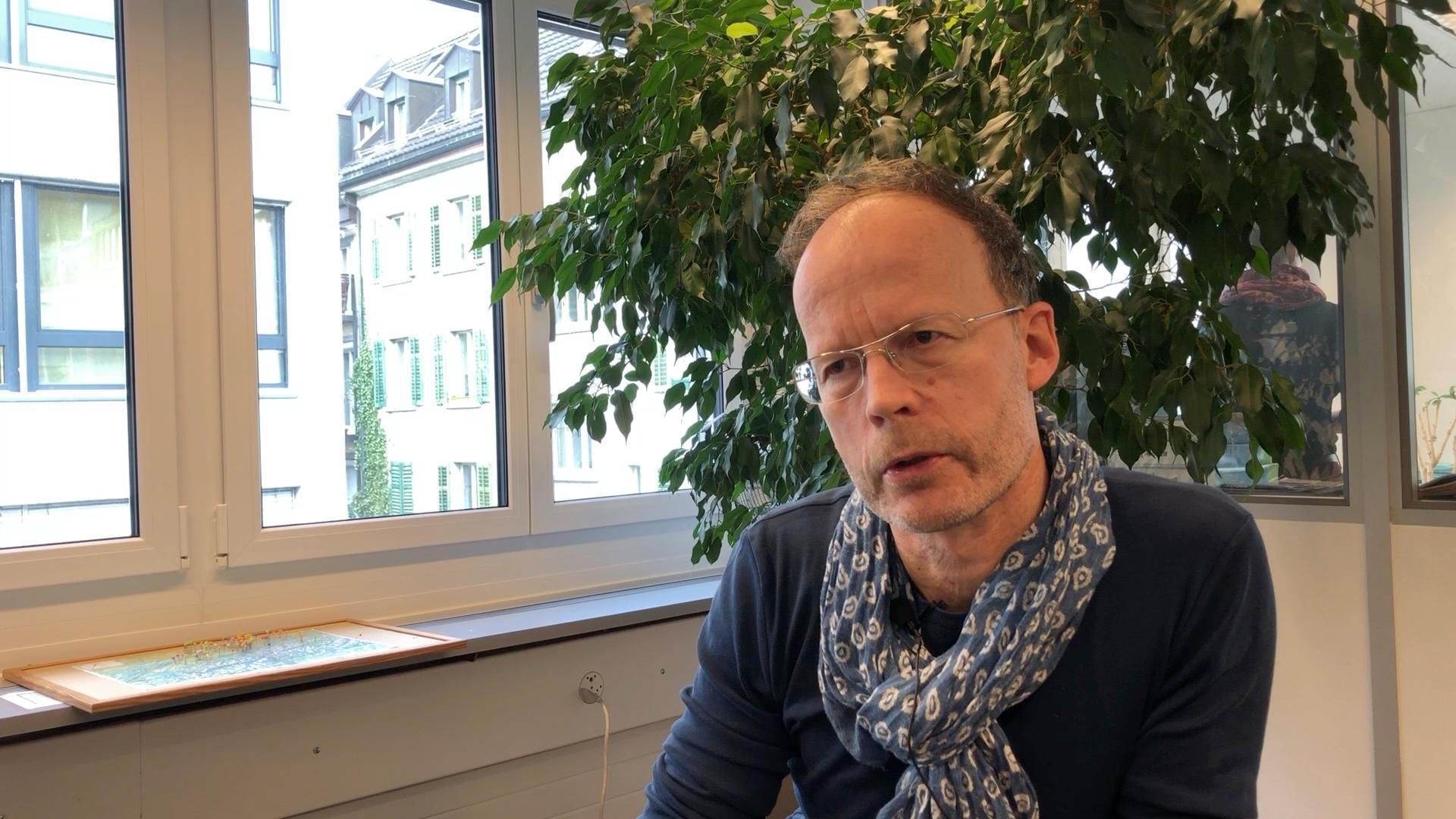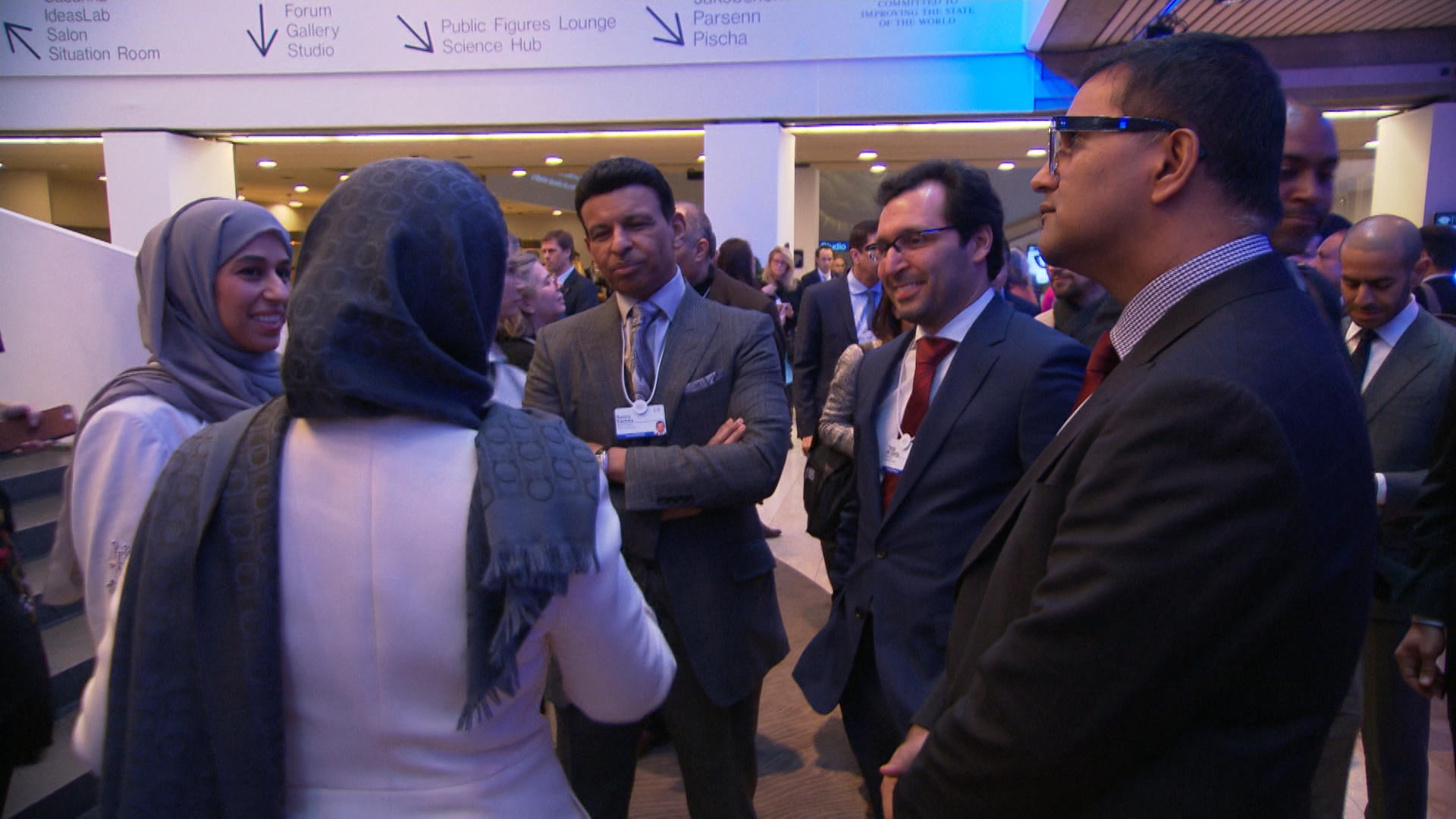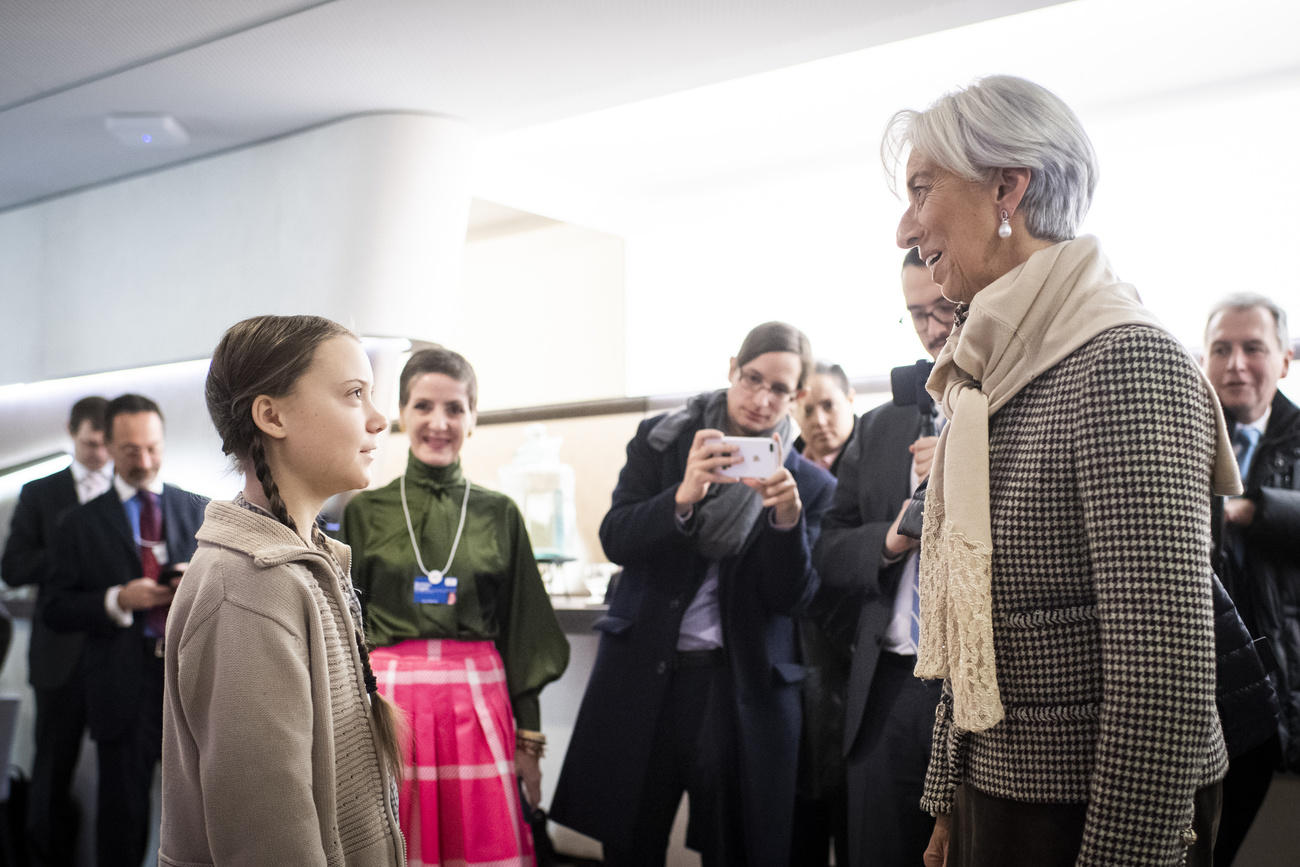
At 50, WEF sets out to prove there’s a better kind of capitalism

Half a century after the first gathering of the business and political elite in Davos, the World Economic Forum continues to encourage them to come together and talk. But with more people demanding action in the streets, WEF organisers are trying to show that the invite-only event can go beyond nice taglines.
In 1973, the world was divided along Cold War ideological lines when WEF founder Klaus Schwab came out with a manifestoExternal link arguing that companies should care about more than profits and loss statements. It was a pioneering idea at a time when teenagers in many countries were protesting wars rather than marching for the climate.
Just three years prior, a year before the first World Economic Forum meeting, Nobel Prize-winning economist Milton Friedman had come out with his oft-cited theoryExternal link that the only social responsibility of business is to increase its profits.
In the decades that followed, Friedman’s theory reigned and Schwab’s took a backseat as business prioritised shareholders above all.
“It has not been an easy fight to make the concept mainstream,” said Schwab, reflecting on his theory during a press conference last week.
As it marks its 50th annual meeting in the Swiss Alpine resort of Davos, the WEF is giving Schwab’s original manifesto a facelift, bringing back the language of stakeholder capitalismExternal link and reminding the public of its mantra since the beginning: that what’s good for society is good for business.
Keeping regulation at bay
The new Davos ManifestoExternal link comes at a time of heightened anxiety in the corporate world as climate activists flood the streets and politicians seek to rein in companies on everything from drug prices to data protection.
Companies are responding. Last year, an industry organisation of chief executives in the US made headlines when more than 180 CEOs signed a statementExternal link redefining the purpose of a corporation to include the interests of a broader swath of stakeholders. But the statement was more reactionary than ground-breaking at a time when companies are under growing pressure from employees, suppliers and communities.
Oliver Classen from the Swiss NGO Public Eye, which has organised anti-WEF actions in Davos over the years, questions the motives behind some of the statements coming from companies and WEF.
“Corporates have never been under as much pressure as they are today,” he told swissinfo.ch, citing the Australian bushfires. Corporates, especially in the oil and gas industryExternal link, are getting backed into a corner to do more about climate change before regulation comes.
Public pressure is also being felt in Switzerland, where lax regulation has been a selling point for companies to set up shop. The Swiss parliament is expected to pick up the debate on the Responsible Business Initiative in the next few months, which would oblige companies to take responsibility for human rights and environmental abuses abroad. It is likely that the Swiss people will vote on the initiative this year.
Frédéric Dalsace, a professor at the Lausanne-based IMD global business school, agrees to some extent. “You have the carrot and the stick. There is a race. Will firms turn around fast enough, or will governments step in?”

More
Is stakeholder capitalism the answer?
Put to the test
The Financial Times reportedExternal link that more than half of the biggest US companies have signed letters supporting “purpose”. Even some of the most-vilified companies by NGOs have changed their framing.
Switzerland-based commodity giant Glencore now talks about its missionExternal link as “responsibly sourcing commodities for everyday life” instead of simply being a “producer and marketer of commodities operating around the world” as it described itself in 2015.External link
But when companies’ core activities are questioned, their willingness to change can reach its limits. German industrial conglomerate Siemens found itself the targetExternal link of climate activists including Swedish teenager Greta Thunberg for its involvement in an Australian coal mine amid the fires that have engulfed a portion of the country many times the size of Switzerland.
Despite the activists’ pressure, Siemens opted to go ahead with the coal project. The company’s CEO Joe Kaeser stated thatExternal link, “While I do have a lot of empathy for environmental matters, I do need to balance different interests of different stakeholders.”
This leads people like Christy Hoffman, the General Secretary of UNI Global Union, to come to Davos with a dose of scepticism. “It’s not enough to say that we want to make the world a better place,” she told swissinfo.ch.
“If stakeholder capitalism is going be something truly new and not just a sprinkling of good deeds, it has to represent a fundamental shift in power in favour of working people.”

More
Ten questions about the World Economic Forum
There are many examples of companies that have made U-turns on products or projects because they didn’t mesh with their own values and ethics or are developing solutions to pressing global challenges. Whatever the motives, this is something unheard of a few decades ago.
Even more potent than regulation, shareholders or even activists, says Dalsace, are discerning consumers equipped with digital tools. “When Nespresso pods first came out there was no concern for sustainability, but consumers demanded it and Nestlé has had to change.”
No more solo acts
Classen also worries that all the talk is a distraction from the fundamental need for accountability. “It is like the arsonists calling themselves firefighters. Companies present themselves as the ones solving the problems, but they created them,” he says.
To him, the partnership agreementExternal link signed by the WEF and the United Nations last year is the epitome of the problem. The agreement “draws a picture that would make corporate executives chief whisperers to UN agencies and programs. This is the most outrageous example of corporate capture of global governance we have witnessed.”
Immediately after it was announced last year, the agreement attracted harsh criticism from more than 250 civil society groups who signed a letterExternal link calling on the UN to terminate the deal. They said that the “corporatisation of the UN” would de-legitimise the UN and reduce public support, with multilateralism already under threat.
UN agencies have faced criticism for partnering with business including the International Labour Organisation’s acceptance of funds from the tobacco industry.
WEF’s Schwab argues that the problems are too complex for any single sector or actor to solve alone. “Big challenges – be it the environment or poverty – cannot be solved by governments alone or by business alone or by civil society,” Schwab told the FTExternal link.
Dalsace agrees that sidelining business isn’t the answer. “You have to face reality. There are companies worth trillions of dollars today. That’s more than the GDP of many countries. The UN has to learn how to talk to these firms if we are going to solve problems.”
And he argues that no country knows this better than Switzerland, with its many multinational companies and international organisations. “It is the Swiss way to seek compromise and work things out.”

More
Who’s who at WEF 2020 in Davos?

In compliance with the JTI standards
More: SWI swissinfo.ch certified by the Journalism Trust Initiative






























You can find an overview of ongoing debates with our journalists here . Please join us!
If you want to start a conversation about a topic raised in this article or want to report factual errors, email us at english@swissinfo.ch.